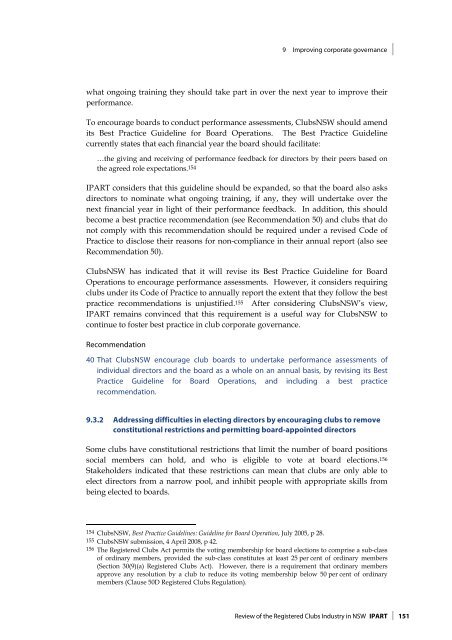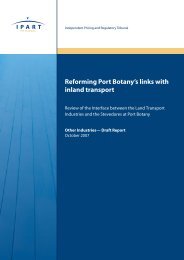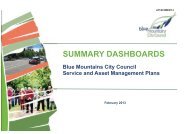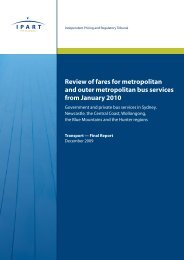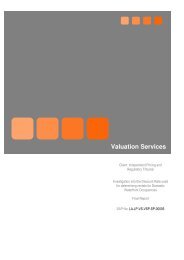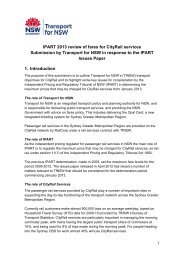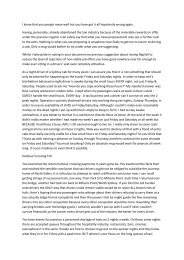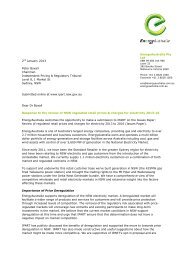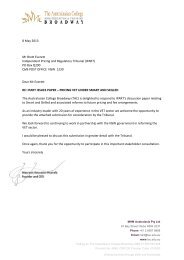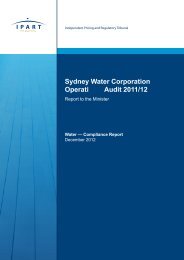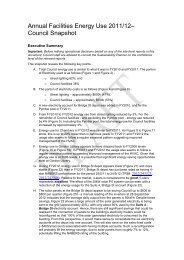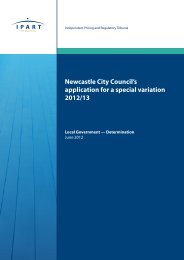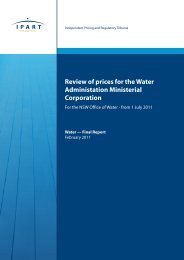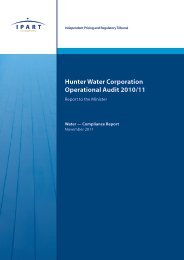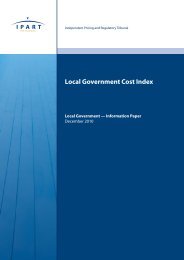Review of the Registered Clubs Industry in NSW - Clubs NSW
Review of the Registered Clubs Industry in NSW - Clubs NSW
Review of the Registered Clubs Industry in NSW - Clubs NSW
Create successful ePaper yourself
Turn your PDF publications into a flip-book with our unique Google optimized e-Paper software.
9 Improv<strong>in</strong>g corporate governance<br />
what ongo<strong>in</strong>g tra<strong>in</strong><strong>in</strong>g <strong>the</strong>y should take part <strong>in</strong> over <strong>the</strong> next year to improve <strong>the</strong>ir<br />
performance.<br />
To encourage boards to conduct performance assessments, <strong>Clubs</strong><strong>NSW</strong> should amend<br />
its Best Practice Guidel<strong>in</strong>e for Board Operations. The Best Practice Guidel<strong>in</strong>e<br />
currently states that each f<strong>in</strong>ancial year <strong>the</strong> board should facilitate:<br />
…<strong>the</strong> giv<strong>in</strong>g and receiv<strong>in</strong>g <strong>of</strong> performance feedback for directors by <strong>the</strong>ir peers based on<br />
<strong>the</strong> agreed role expectations. 154<br />
IPART considers that this guidel<strong>in</strong>e should be expanded, so that <strong>the</strong> board also asks<br />
directors to nom<strong>in</strong>ate what ongo<strong>in</strong>g tra<strong>in</strong><strong>in</strong>g, if any, <strong>the</strong>y will undertake over <strong>the</strong><br />
next f<strong>in</strong>ancial year <strong>in</strong> light <strong>of</strong> <strong>the</strong>ir performance feedback. In addition, this should<br />
become a best practice recommendation (see Recommendation 50) and clubs that do<br />
not comply with this recommendation should be required under a revised Code <strong>of</strong><br />
Practice to disclose <strong>the</strong>ir reasons for non-compliance <strong>in</strong> <strong>the</strong>ir annual report (also see<br />
Recommendation 50).<br />
<strong>Clubs</strong><strong>NSW</strong> has <strong>in</strong>dicated that it will revise its Best Practice Guidel<strong>in</strong>e for Board<br />
Operations to encourage performance assessments. However, it considers requir<strong>in</strong>g<br />
clubs under its Code <strong>of</strong> Practice to annually report <strong>the</strong> extent that <strong>the</strong>y follow <strong>the</strong> best<br />
practice recommendations is unjustified. 155 After consider<strong>in</strong>g <strong>Clubs</strong><strong>NSW</strong>’s view,<br />
IPART rema<strong>in</strong>s conv<strong>in</strong>ced that this requirement is a useful way for <strong>Clubs</strong><strong>NSW</strong> to<br />
cont<strong>in</strong>ue to foster best practice <strong>in</strong> club corporate governance.<br />
Recommendation<br />
40 That <strong>Clubs</strong><strong>NSW</strong> encourage club boards to undertake performance assessments <strong>of</strong><br />
<strong>in</strong>dividual directors and <strong>the</strong> board as a whole on an annual basis, by revis<strong>in</strong>g its Best<br />
Practice Guidel<strong>in</strong>e for Board Operations, and <strong>in</strong>clud<strong>in</strong>g a best practice<br />
recommendation.<br />
9.3.2 Address<strong>in</strong>g difficulties <strong>in</strong> elect<strong>in</strong>g directors by encourag<strong>in</strong>g clubs to remove<br />
constitutional restrictions and permitt<strong>in</strong>g board-appo<strong>in</strong>ted directors<br />
Some clubs have constitutional restrictions that limit <strong>the</strong> number <strong>of</strong> board positions<br />
social members can hold, and who is eligible to vote at board elections. 156<br />
Stakeholders <strong>in</strong>dicated that <strong>the</strong>se restrictions can mean that clubs are only able to<br />
elect directors from a narrow pool, and <strong>in</strong>hibit people with appropriate skills from<br />
be<strong>in</strong>g elected to boards.<br />
154 <strong>Clubs</strong><strong>NSW</strong>, Best Practice Guidel<strong>in</strong>es: Guidel<strong>in</strong>e for Board Operation, July 2005, p 28.<br />
155 <strong>Clubs</strong><strong>NSW</strong> submission, 4 April 2008, p 42.<br />
156 The <strong>Registered</strong> <strong>Clubs</strong> Act permits <strong>the</strong> vot<strong>in</strong>g membership for board elections to comprise a sub-class<br />
<strong>of</strong> ord<strong>in</strong>ary members, provided <strong>the</strong> sub-class constitutes at least 25 per cent <strong>of</strong> ord<strong>in</strong>ary members<br />
(Section 30(9)(a) <strong>Registered</strong> <strong>Clubs</strong> Act). However, <strong>the</strong>re is a requirement that ord<strong>in</strong>ary members<br />
approve any resolution by a club to reduce its vot<strong>in</strong>g membership below 50 per cent <strong>of</strong> ord<strong>in</strong>ary<br />
members (Clause 50D <strong>Registered</strong> <strong>Clubs</strong> Regulation).<br />
<strong>Review</strong> <strong>of</strong> <strong>the</strong> <strong>Registered</strong> <strong>Clubs</strong> <strong>Industry</strong> <strong>in</strong> <strong>NSW</strong> IPART 151


